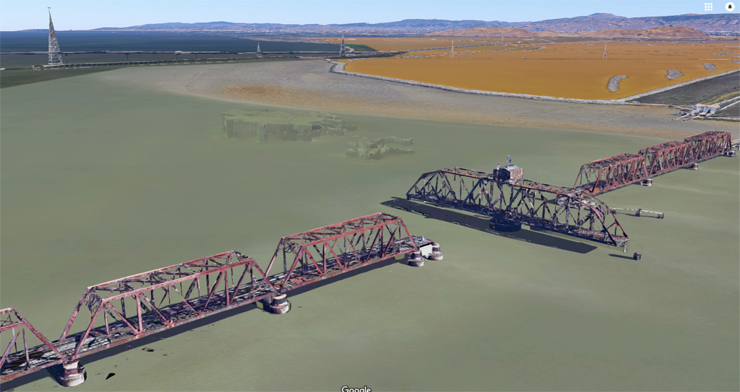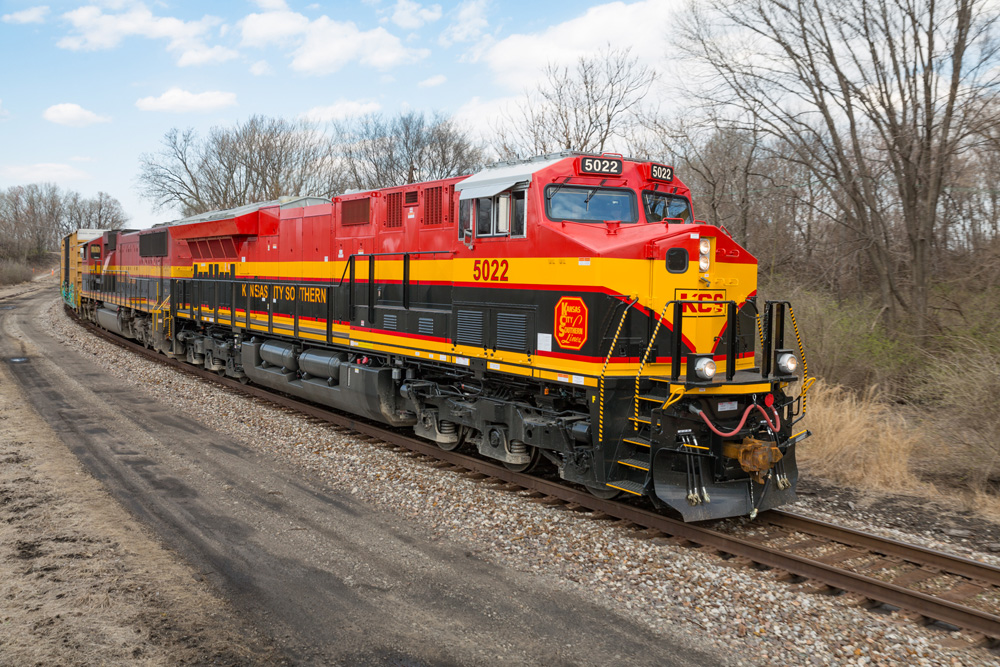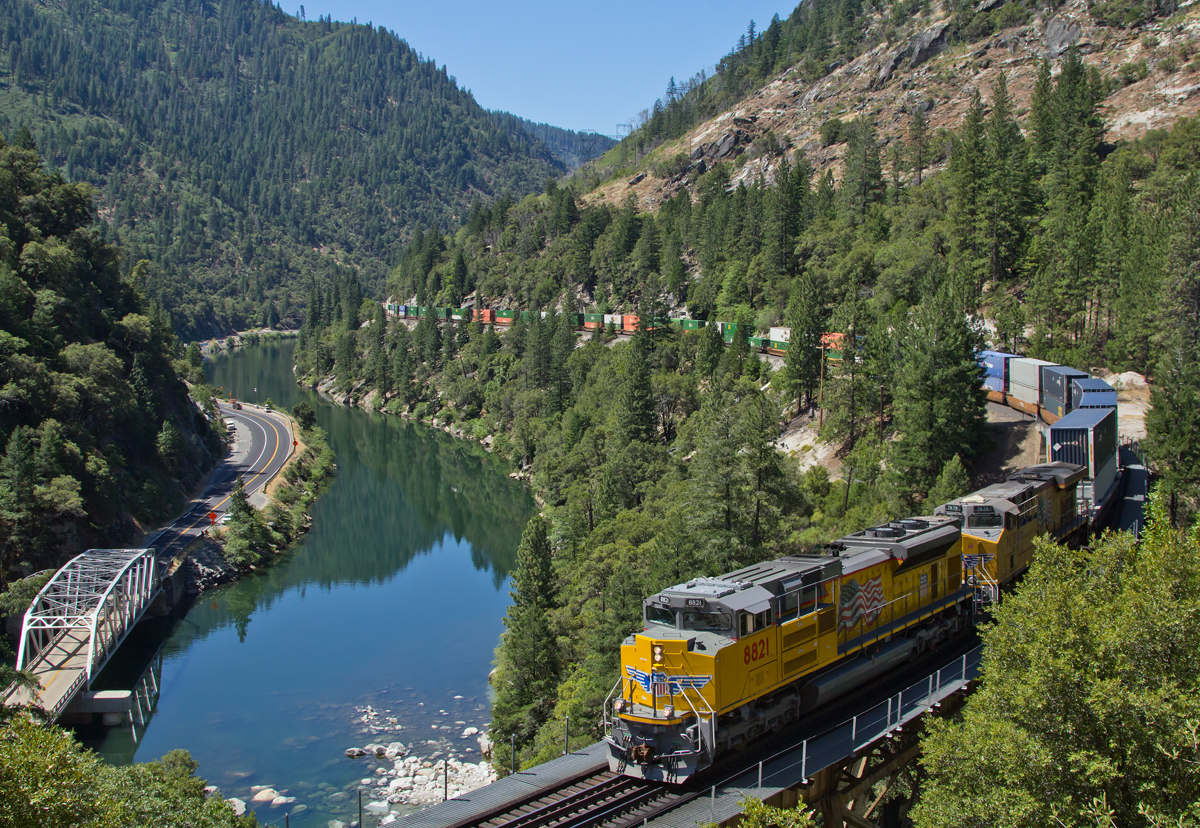Tuesday morning rail news in brief:
Facebook may pull back from funding transit study
Facebook is reconsidering its commitment to fund a study on the revival of the Dumbarton Rail Corridor, which would make use of a long-dormant former Southern Pacific bridge across southern San Francisco Bay. The Palo Alto Daily Post quotes Juan Salazar, the social media giant’s director of local policy and community engagement, as saying the company is “reassessing this long-term commitment” to the project in light of COVID-19, as the company is focusing on “addressing the immediate needs of people in the community struggling with the economic impacts of the pandemic.” Facebook, local transit agency SamTrans, and investment firm Plenary Group combined in 2018 to start an environmental study of the project, which would bring rail service to a route adjacent to Facebook’s Menlo Park headquarters [see “Facebook could help revive former San Francisco Bay rail bridge,” Trains News Wire, June 15, 2018]. An additional phase of the study is needed before the project can be eligible for public funding.
Local effort to save bridge loses in court, could be done
A seven-year legal battle to save a wooden Union Pacific trestle in the Willow Glen neighborhood of San Jose, Calif., may be over after a state appeals court refused to overturn a lower-court decision allowing the city to tear down the 98-year-old structure and replace it with a new bridge for a city trail. The San Jose Mercury news reports the bridge, built in 1921, was part of a UP right of way bought by the city in 2011 to extend the Three Creek Rail and connect to the Los Gatos Creek Trail. When the city initially planned to tear the wooden bridge down and replace it with a steel bridge, the Willow Glen Trestle Conservancy and Friends of Willow Glen Trestle filed suit. After losing in a first round of litigation, the current legal effort revolved around the fact the trestle has been listed on the state Register of Historical Resources, which the group said should require a new environmental study before it can be replaced. An attorney for the city expressed hope that the latest decision means work can advance on the new bridge, while a lawyer for the conservancy indicated she plans to seek a new hearing.
Bill would provide $250 million annually for grade crossing improvements
A bill introduced by U.S. Sen. Edward Markey (D-Mass.) would commit the federal government to funding $250 million annually for grade crossing improvement projects. The “Warren Cowles Grade Crossing Safety Act,” named for a Longmeadow, Mass., worker killed in a 2017 grade-crossing accident, would add those funds to the Federal Railroad Administration’s existing Consolidated Rail Infrastructure and Safety Improvements capital grants program. Markey, in his first full term in the Senate after being elected in a 2013 special election for the final 17 months of a vacated seat, is a member of the Senate Commerce, Science, and Transportation committee.















Gerald, infrastructure isn’t limited to Hwys it includes water, sewer, electrical etc which have been long neglected due to Americans ignorance of what really matter for their health & well being.
Galen, there will NOT be a corresponding reduction in highway funding…if nothing else it can be directed at the tremendous backlog of needed repairs to the national infrastructure system.
There should/will be a corresponding reduction in need for additional Hwy funding there are already less cars on the road and reduced pollution.
Mike Friedman, it still remains to be seen how many employees would be willing to take a pay cut to work from home vs the office, and the assumption they could lower salaries of employees in the Corporate office that work from home is laughable…the cost of living in the 9 Bay Area Counties is practically identical. Also, the service wasn’t just projected to go North after crossing the bay on the bridge, it was also projected to head South to Santa Clara/San Jose, though why you’d compete with the currently under construction BART extension is beyond me. I could see running service to Santa Clara and turning around there, but not all the way into downtown San Jose.
Yes, Facebook owns its campus in Menlo Park, but thinking long term means re-evaluating how much MORE office space you need to meet the demands of your workforce in 5-20 years.
JEFFREY — Robert’s friend is a microcosm of our future – the coming death of public transportation in America, the end of everything that members of this forum (including Robert) have wanted. Possibly she took the Orange Line between North Station and Back Bay Station. Myself a frequent flier on the other three lines (Red, Blue and Green) I’m here to tell you these are our choices: overcome a fear of this epidemic and go back to before, or watch this nation devolve into a very uncertain future. I’ve been so crowded on the Green Line I practically had to stand on tiptoes. I’m still alive to tell about it.
Facebook IS thinking long term. They are re-evaluating how much office space they really need in light of their promise to allow all workers to Work From Home in the future.
Facebook might be considering what their long term future looks like, and this is a company that just said employees can work from home permanently.
Facebook is not thinking long term. Few companies think long term (25-50 years) unless mandated by Congress (Us Post Office). That is a failing of capital and bean counters.
In an economy that might be very slow to recover it will be difficult to fund an all-new project when we’re countless billions behind on the capital to keep existing lines in operation.
Wouldn’t be a smart move on Facebook’s part, the e-economy isn’t going to be as slow to return to normal(it’s actually been bolstered by the virus) and people are still going to need to commute to Facebook’s headquarters from the East Bay. Housing here hasn’t been affected as of yet, neither has rental rates…I’m not sure what they’re thinking in Menlo Park is, if they’re even thinking at all.
The Dumbarton Rail Bridge looks similar to Norfolk Southern’s railway bridge spanning the Tennessee River at Decatur, Alabama 23 miles southwest of Huntsville on the former Memphis Division of Southern Railway. Though similar in appearance, the Decatur bridge is far from dormant with freight trains of both Norfolk Southern between Chattanooga and Memphis and CSX between Nashville and Birmingham traversing it.
Robert McGuire: by switching from public transportation to automobile, your friend is greatly increasing her chances of being injured or killed in an accident by driving a car. I wonder if she took that into account? My guess is not, because people don’t think accidents are going to happen to them.
The comments on work from home are correct. That said the focus on one tech company’s commute needs is too narrow given overall transportation needs in the region. Roadways inbound to Santa Clara County in the morning and outbound in the evening are horrendous (at least up to when the pandemic social isolation happened). The idea of the all of the region’s biggest employers chipping in for the regional mobility improvements they benefit from (and the commuter demand they generate) is sound policy If executed well. That said it was very unfortunate that the proposed Dumbarton line would only integrate with Amtrak Capital Corridor Service on the east end In Fremont and would not be even walkably accessible to the BART Fremont stop. Balkanized poorly integrated public transportation systems are a big problem with most metros that have multiple overlaid transit systems some of which had been built long ago.
FYI, for all of you saying Facebook is thinking long term, you need to go look at their campus in Menlo Park. They own the site, they own all the office buildings on that site…just what do you think they’re going to do with those office buildings they own, leave them empty? Fat chance of that happening, huge waste of money as that real estate isn’t suitable for housing, it’s part of an industrial/office zoned location. The service would not have just benefited Facebook though, but also other businesses up the Peninsula from Redwood City to Millbrae that also have workers commuting by either the Dumbarton Bridge or San Mateo-Hayward Bridge, it was projected to carry upwards of 18,000 people a Day, that’s a lot of vehicles removed from the roadways.Robert McGuire, you’re not a very good friend if you let that woman you know buy a new car because she’s paranoid(and it is paranoia at this point). I would’ve talked her out of it myself, not going to let people I know be stupid about things like travel, it’s a lot safer than people think it is, and remember, you have to be around someone for 10 MINUTES and within 6 FEET before you have a CHANCE of catching the virus(it’s still not guaranteed everyone will catch it). There are always outliers that never catch anything asymptomatic or not, they just don’t have the right physiology to host some viruses.
There will soon be a glut of office space on the market so this is a smart move by Facebook. This working from home has been a success in most respects. The employees like the flexibility and the employers like the fact that they don’t need as much office space. It will not go away for the foreseeable future. This may also affect short distance rail travel as Zoom has been discovered and well used. My wife is an administrator at a small church in Maine and they have seen a considerable increase in the number of people “attending” their services via Zoom. They are in no rush to go back and meet in person. This will also translate to businesses. Amtrak and the commuter operators that go back to the same level of service too soon may find that they are hauling a lot of sparsely patronized trains. No one I know is in any hurry to travel by any means other than by their own personal automobiles. A friend who used to travel regularly from Maine to Connecticut via bus and train to New Haven and then car rental just bought a new vehicle because she plans on driving from now on. Recovery is not going to be quick.